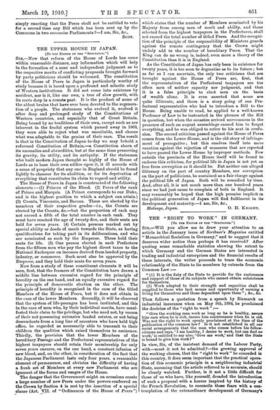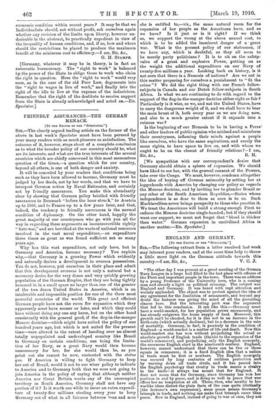THE " RIGHT TO WORK " IN GERMANY.
pro THE EDITOR OF TH3 " SPECTATOR."1
you allow me to draw your attention to an article in the January issue of Scribner's Magazine entitled " Monarchical Socialism in Germany," and to suggest that it deserves wider notice than perhaps it has received P Alter quoting some remarkable statistics showing the extent to which Germany and the German States are interested in trading and industrial enterprises and the financial results of these interests, the writer proceeds to trace the economic relationship of the State to its members by extracts from the Common Law :—
" (1) It is the duty of the State to provide for the sustenance and support of those of its subjects who cannot obtain subsistence for themselves.
(2) Work adapted to their strength and capacities shall be supplied to those who lack means and opportunity of earning a living for themselves and those dependent upon them " ; duo.
Then follows a quotation from a speech by Bismarck on industrial insurance when on May 9th, 1884, he proclaimed the doctrine of the "right to work "
" Give the working man work as long as he is healthy, assure him care when he is sick, insure him maintenance when he is old. Was not the right to work openly proclaimed at the time of the publication of the common law P Is it not established in all our social arrangements that the man who comes before his fellow- citizens and says, I am healthy, I desire to work, but can find no work,' is entitled to say also, Give me work,' and that the State is bound to give him work?"
In view, Sir, of the insistent demand of the Labour Party, with—must it not be admitted P—the growing approval of the working classes, that the " right to work " be conceded in this country, it does seem important that the practical opera- tion of this economic principle in a neighbouring industrial State, assuming that the article referred to is accurate, should be closely watched. Further, is it not a little difficult for those of us who have, like yourself, dreaded the introduction of such a proposal with a horror inspired by the history of the French Revolution, to reconcile these fears with a con- templation of the extraordinary development of Germany's
economic condition within recent years P It may be that we Individualists should, not without profit, ask ourselves again whether any revision of the limits upon liberty, however un- desirable in the abstract, be practically expedient in view of the inequality of human conditions, and, if so, how and where should the restrictions be placed to produce the maximum benefit at the minimum cost to efficiency.—I am, Sir, &c., G. H. STAMPS.
[Germany, whatever it may be in theory, is in fact an autocratic bureaucracy. The " right to work" is balanced by.tbe power of the State to oblige those to work who claim the right in question. Here the " right to work " would very soon, as in the case of the old Poor Law, degenerate into the " right to wages h lieu of work," and finally into the right of the idle to live at the expense of the industrious. Remember that the right of the destitute to receive support from the State is already acknowledged and acted on.—En. Spectator.]











































 Previous page
Previous page